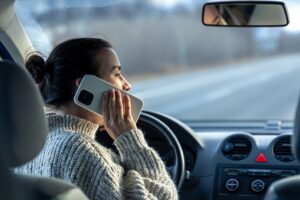
If you see someone that is driving recklessly or you suspect that they may be under the influence, you may wonder if you should call the police and report the driver. We all want to drive on safe roads, but can police just take your word for it and pull over the suspect as soon as they catch up to the vehicle you called in? In today’s blog, we take a closer look at whether or not someone can call in another person’s license plate and have them arrested for DWI in Minnesota.
Phoning In A DUI Suspect
You are within your rights to call police if you suspect that someone may be driving under the influence of drugs or alcohol. Once on the line, you’ll be asked for some specific information, and police will likely tell you to avoid trying to keep up with the driver or doing anything that could put your safety or the safety of others on the road at risk. Police will likely do what they can to have an officer get in position to make a traffic stop.
However, here is the key. Your word alone is not enough to allow police to conduct a traffic stop on the suspicion of drunk driving. You may have see someone stumble out of the bar and speed across two lanes of traffic to get to the highway, but it doesn’t matter. Your testimony does not rise to the level of reasonable suspicion. If it did, anyone could call in any driver that upset them or honked at them in hopes that police would pull them over. While police appreciate the tip, your phone call does not give them enough evidence to conduct a traffic stop.
Instead, a police officer needs to witness a traffic infraction for themselves before they can conduct a legal traffic stop. The officer may pull behind the vehicle and watch it for a few minutes to observe if they are having a tough time maintaining their lane or are driving at erratic speeds. However, if the driver continues to obey the rules of the road, the officer cannot pull them over on suspicion of DUI.
Once an officer spots a traffic infraction, they can legally conduct a stop and look for more evidence that the driver may be under the influence. If their eyes are watery or bloodshot, they are slurring their speech or the officer can smell alcohol, they may have the individual step out of the vehicle for additional testing.
So while you can call in a suspected drunk driver, your phone call is not enough evidence for a police officer to conduct a traffic stop without witnessing a traffic infraction for themselves. If you believe that your rights were violated during the traffic stop, or you just want to talk to a professional about your defense options, reach out to Avery and the team at Appelman Law Firm today at (952) 224-2277.





